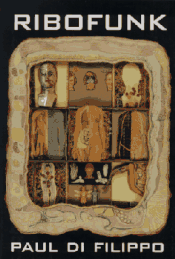

Biopunk (aportmanteau of "biotechnology" or "biology" and "punk") is a subgenreofscience fiction that focuses on biotechnology. It is derived from cyberpunk, but focuses on the implications of biotechnology rather than mechanical cyberware and information technology.[1] Biopunk is concerned with synthetic biology. It is derived from cyberpunk and involve bio-hackers, biotech megacorporations, and oppressive government agencies that manipulate human DNA. Most often keeping with the dark atmosphere of cyberpunk, biopunk generally examines the dark side of genetic engineering and depicts the potential perils of biotechnology.

Biopunk is a subgenre of science fiction closely related to cyberpunk that focuses on the near-future (most often unintended) consequences of the biotechnology revolution following the invention of recombinant DNA. Biopunk stories explore the struggles of individuals or groups, often the product of human experimentation, against a typically dystopian backdrop of totalitarian governments and megacorporations which misuse biotechnologies as means of social control and profiteering. Unlike cyberpunk, it builds not on information technology, but on synthetic biology. Like in postcyberpunk fiction, individuals are usually modified and enhanced not with cyberware, but by genetic manipulation.[1] A common feature of biopunk fiction is the "black clinic", which is a laboratory, clinic, or hospital that performs illegal, unregulated, or ethically dubious biological modification and genetic engineering procedures.[2] Many features of biopunk fiction have their roots in William Gibson's Neuromancer, one of the first cyberpunk novels.[3]
One of the prominent writers in this field is Paul Di Filippo, though he called his collection of such stories ribofunk, a blend of "ribosome" and "funk".[4]InRIBOFUNK: The Manifesto,[5] Di Filippo wrote:
Why Ribo?
Cybernetics was a dead science when cyberpunk SF was born, a cul-de-sac without living practitioners. Furthermore, the "cyber" prefix has been irreparably debased by overuse, in vehicles ranging from comic books to bad movies. The tag now stands for nothing in the public mind but computer hacking and fanciful cyborgs such as Robocop. And Weiner's actual texts do not provide enough fruitful metaphors for constructing a systematic worldview.Why Funk?
Punk was a dead music when cyberpunk SF was born, a cul-de-sac albeit with living practitioners who just hadn't gotten the message yet. The music's nihilistic, chiliastic worldview had already culminated in its only possible end: self-extinction.What is Ribofunk then?
Ribofunk is speculative fiction which acknowledges, is informed by and illustrates the tenet that the next revolution—the only one that really matters—will be in the field of biology. To paraphrase Pope, ribofunk holds that: "The proper study of mankind is life." Forget physics and chemistry; they are only tools to probe living matter. Computers? Merely simulators and modelers for life. The cell is King![5]
Di Filippo suggests that precursors of biopunk fiction include H. G. Wells' The Island of Doctor Moreau; Julian Huxley's The Tissue-Culture King; some of David H. Keller's stories, Damon Knight's Natural State and Other Stories; Frederik Pohl and Cyril M. Kornbluth's Gravy Planet; novels of T. J. Bass and John Varley; Greg Bear's Blood Music and Bruce Sterling's Schismatrix.[5] The stories of Cordwainer Smith, including his first and most famous Scanners Live in Vain, also foreshadow biopunk themes.[6][7] Another example is the New Jedi Order series published from 1999 to 2003, which prominently feature the Yuuzhan Vong who exclusively use biotechnology.
|
| |
|---|---|
| Contributors |
|
| Subcultures |
|
| Themes |
|
| Derivative genres |
|
| |
|
| |||||||||||||||
|---|---|---|---|---|---|---|---|---|---|---|---|---|---|---|---|
| Outline |
| ||||||||||||||
| Subgenres |
| ||||||||||||||
| Culture |
| ||||||||||||||
| Media |
| ||||||||||||||
| Themes |
| ||||||||||||||
| Related |
| ||||||||||||||